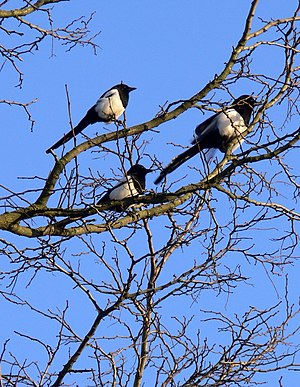One for Sorrow (nursery rhyme)
| "One for Sorrow" | |
|---|---|
 Three magpies in a tree | |
| Nursery rhyme | |
| Published | c. 1780 |
"One for Sorrow" is a traditional children's nursery rhyme about magpies. According to an old superstition, the number of magpies seen tells if one will have bad or good luck.
Lyrics
There is considerable variation in the lyrics used. A common modern version is:
One for sorrow,
Two for joy,
Three for a girl,
Four for a boy,
Five for silver,
Six for gold,
Seven for a secret never to be told.[1]
Origins

The rhyme has its origins in ornithomancy superstitions connected with magpies, considered a bird of ill omen in some cultures, and in Britain, at least as far back as the early sixteenth century.[3] The rhyme was first recorded around 1780 in a note in John Brand's Observations on Popular Antiquities on Lincolnshire with the lyric:
One for sorrow,
Two for mirth,
Three for a funeral
And four for birth
One of the earliest versions to extend this was published, with variations, in Michael Aislabie Denham's Proverbs and Popular Saying of the Seasons (London, 1846):
One for sorrow,
Two for mirth
Three for a funeral,
Four for birth
Five for heaven
Six for hell
Seven for the devil, his own self
On occasion, jackdaws, crows and other Corvidae are associated with the rhyme, particularly in America where magpies are less common.[4] In eastern India, the erstwhile British colonial bastion, the common myna is the bird of association.[5]
A version of the rhyme became familiar to many UK children when it became the theme tune of the children's TV show Magpie, which ran from 1968 to 1980.[6] The popularity of this version is thought to have displaced the many regional versions that had previously existed.[7]
Popular culture
The name of the rock band Counting Crows derives from the rhyme,[8] which is featured in the song "A Murder of One" on the band's debut album, August and Everything After.
The first track on Seanan McGuire's album Wicked Girls, also titled "Counting Crows", features a modified version of the rhyme.[9]
The artist S. J. Tucker's song, "Ravens in the Library," from her album Mischief, utilizes the modern version of the rhyme as a chorus, and the rest of the verses relate to the rhyme in various ways.[10]
David Dodds used the rhyme as the chorus for his song "Magpie"; it also included the lyric "Devil, Devil, I defy thee", having been inspired by an older woman he gave a lift to once in his new car. As a supposed counter-curse to the bad luck brought by witnessing a magpie, the woman would say the expression and spit whnever she saw a one during their journey. The English band The Unthanks recorded a version of this song on their 2015 album "Mount the Air".[11]
Anthony Horowitz used the rhyme as the organizing scheme for the story-within-a-story in his 2016 novel Magpie Murders and in the subsequent television adaptation of the same name.
Notes
- ^ P. Tate (2010). Flights of Fancy: Birds in Myth, Legend, and Superstition. New York: Random House. ISBN 978-1409035695.
- ^ Finaldi, Gabriele (1 December 1992). "Picture Choice: Gabriele Finaldi on pictorial wisdom in Piero's relaxed Nativity". The Independent. Archived from the original on 24 May 2022. Retrieved 2 February 2013.
- ^ I. Opie and M. Tatem, eds, A Dictionary of Superstitions (Oxford University Press, 1989), pp. 235-6.
- ^ J. M. Marzluff, A. Angell, P. R. Ehrlich, In the Company of Crows and Ravens (Yale University Press, 2007), p. 127.
- ^ "With Death on its wings".
- ^ Wilkinson, Dean (18 July 2011). The Classic Children's Television Quiz Book. Andrews UK Limited. ISBN 978-1-908548-89-4. Retrieved 15 February 2021.
- ^ Terry Pratchett and Jacqueline Simpson, The Folklore of Discworld (London: Random House, 2010), ISBN 1407034243, p. 449.
- ^ "The Biggest New Band in America". Rolling Stone. 30 June 1994. Archived from the original on 15 November 2006. Retrieved 1 May 2022.
- ^ "Seanan McGuire: Songbook". seananmcguire.com. Retrieved 1 May 2022.
- ^ Ravens in the Library, retrieved 5 June 2022
- ^ "The Magpie [David Dodds]".
References
- Binney, Ruth (2004). Wise Words and Country Ways: Traditional Advice and Whether It Works Today. David & Charles. p. 223. ISBN 0-7153-1846-2.
- The Crow: City of Angels. 1996.